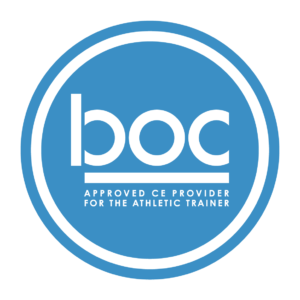For: PT, PTA, OT, ATC, MD
This 4-week tutorial-based course is designed to improve participant’s understanding and application of current best-evidence for basic science of injury and healing, involving neuromusculoskeletal tissues, as well as Sports Biomechanics including running gait cycle, throwing, golf, cycling, swimming, and jumping/landing biomechanics. Participants find and interpret evidence to guide clinical practice using case-based learning examples.
Course Objectives
By the end of the course, a successful learner will be able to:
- Distinguish the foundational and clinical sciences related to structure, movement dysfunction, response to injury and disease, and promotion of health and wellness to enhance sports medicine outcomes for patients with soft tissue (ligament, tendon, cartilage and muscle) injuries.
- Determine the timelines for optimal rehabilitation of musculoskeletal injuries to include age related differences.
- Explain the inflammatory process of musculoskeletal injuries and the evidence basis of clinical management options.
- Establish a plan of care, incorporating evidence-based practice, for the management of musculoskeletal injuries.
- Examine data from a sport specific biomechanical examination and analyze the data to make clinical judgments to guide interventions and optimize patient/client outcomes.
- Produce an injury prevention program with consideration of risk factors for musculoskeletal injuries.
- Identify optimal imaging techniques for the evaluation and management of musculoskeletal injuries.
- Explain soft tissue healing and incorporation (e.g. ligamentization, cartilage restoration procedures, etc.) following surgical intervention.
- Demonstrate proper evaluation and correction of mechanics related to cycling, golf, running (sprinting), soccer, swimming, and tennis to include gender and age-related considerations.
- Outline surgical and non-surgical options in the management of intra-articular injuries (e.g. articular cartilage, meniscus, labral and ligamentous).

Evidence In Motion is an AOTA Approved Provider of professional development. PD activity approval ID# 9251. This Distance learning-interactive activity is offered at 15 CEUs; Intermediate, OT Service Delivery, Foundational Knowledge. AOTA does not endorse specific course content, products, or clinical procedures.
Applicability
Evidence In Motion is a BOC approved provider of continuing education.

